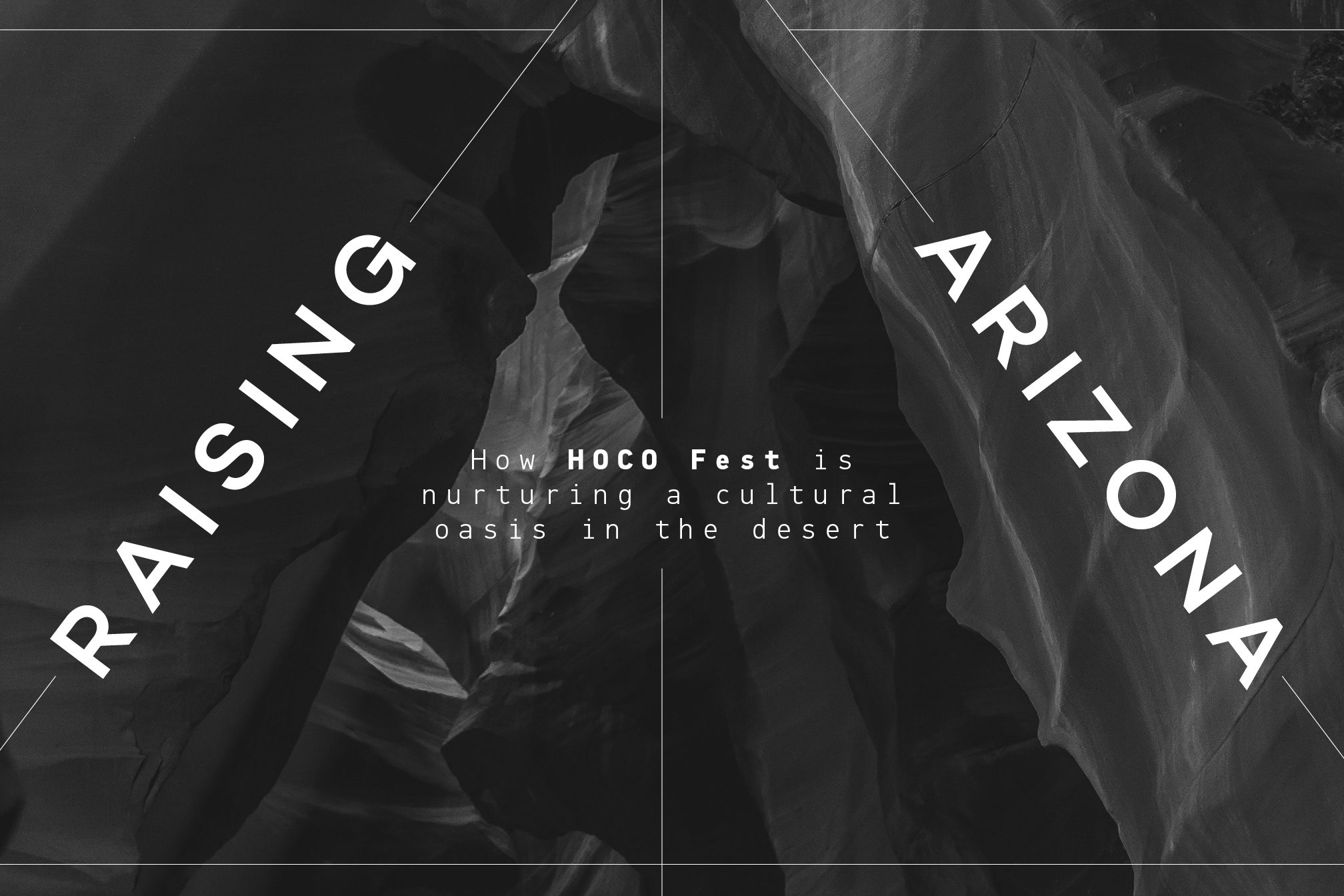 Scene reports
Scene reports
Raising Arizona: How HOCO Fest is nurturing a cultural oasis in the desert
Against a backdrop of oppressive weather - and even more oppressive politics - HOCO Fest showcases the heart of Arizona's resistance
Despite being 5,000 miles away and barely awake at 5am, HOCO Fest has my full attention. An email from the organisers, received in the dead of night, reads: “We just had our legendary haunted room 242 open up for the weekend... You want to stay in there? Very quick backstory - a guest shot herself in the closet of that room in the 1990s.”
The haunted establishment in question is Hotel Congress in Tucson, a 100-year-old landmark known for being the site of infamous bank robber John Dillinger’s capture in 1934. Tucson is located within the Arizonan section of the Sonoran Desert, a 100,000 square mile stretch of baking terrain that also spreads across California and Mexico. Today’s forecast bears an ‘Excessive Heat Warning’ from the federal government with highs of 42°C predicted. An intimidating reputation is preceding Arizona — but the reality proves inspiring.
Read this next: Rave the planet: How dance music can limit its environmental impact
Even before arriving, Arizona subverts expectations. Crossing over the desert by air reveals an imposing landscape far removed from notions of a barren wasteland. Jagged mountain tips scrape the skyline, bullish plant life stands fast in the terracotta ground and turquoise water gleams in the pits of quarry formations. The Sonoran Desert’s rainfall pattern produces more plant species than any other desert in the world. It’s the only place you’ll find the famous saguaro cactus, typically drawn in a three-pronged configuration. These mighty plants thrive through intense heat and drought, often living for more than 150 years and exceeding heights of 40 feet. There’s an intrinsic connection between the Sonoran land and its occupants. In Tucson, the local community are also resilient and determined to prosper in the face of trying conditions.
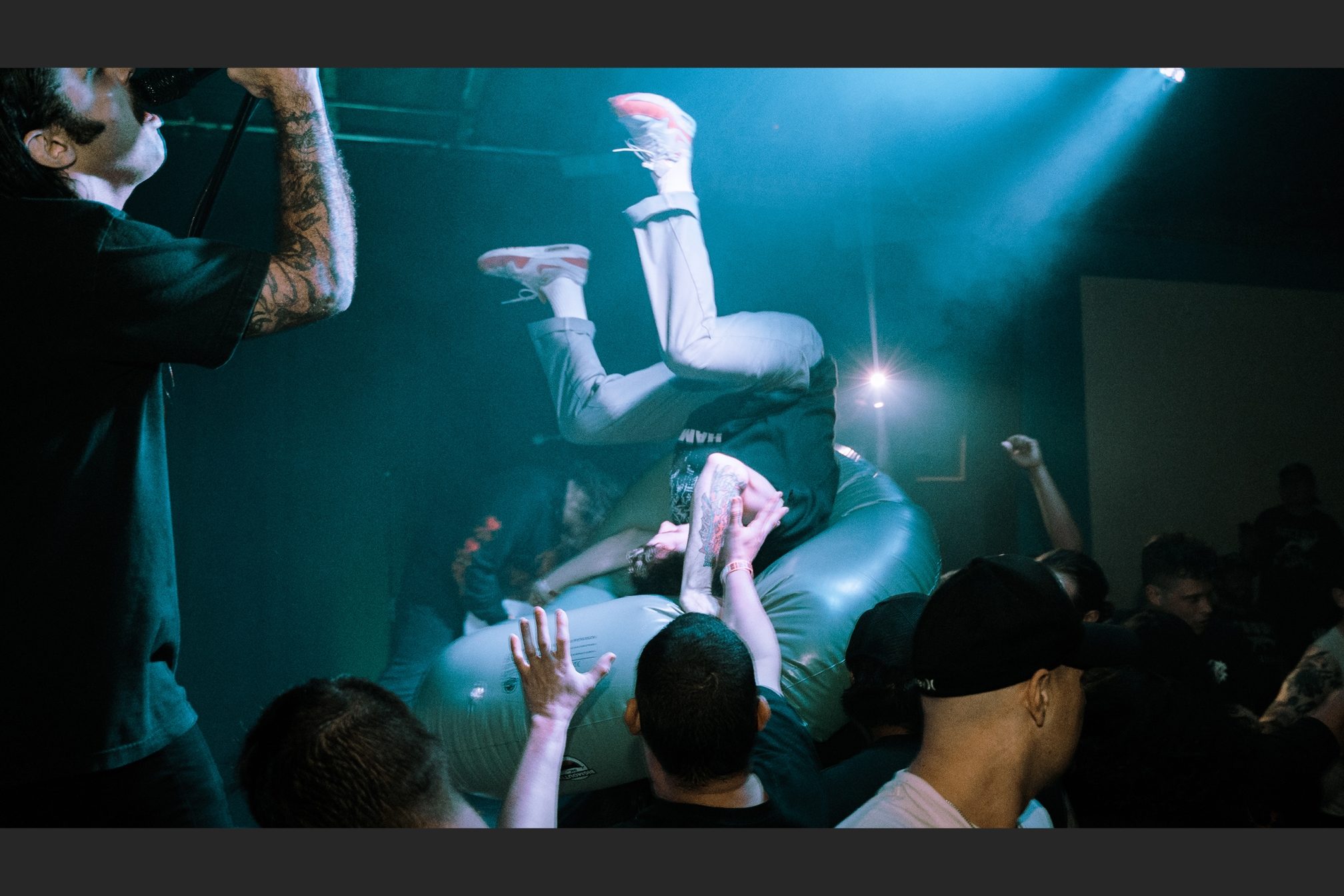
The evidence of this community and their tireless work are plain to see at HOCO Fest. Across four days in stifling late-August heat, the Downtown becomes a living organism of uplifting activity. There’s panels, parties, live music, lectures, hikes, yoga, specialist workshops and more. At the centre is Hotel Congress. To outsiders it’s haunted, a refuge for gangsters; Tucson residents know it as vital cultural hub working to enliven the city. The hotel’s entertainment director David Slutes founded HOCO Fest in 2004 as a means to celebrate local culture and inject life into a historically dead Labor Day weekend, harnessing the scorching weather to run the program on solar power. 15 years down the line it’s developed into a multi-venue venture with big ambitions at its core. The ensuing pulse of hopeful energy that surrounds HOCO Fest is tangible.
A contributing force to this dynamism is HOCO director Matt Baquet. He’s a bundle of enthusiasm as he greets us at Hotel Congress, giving off an affable Old West impression as he hollers “Welcome to Tucson!”, beaming beneath a white gunslinger hat. Matt was born and raised in the city, although spent some time in Los Angeles helping to run UNION nightclub followed by two years working alongside brands like Gucci and Givenchy at a high-flying production job in New York. Last year he moved back to Tucson full time, guided by a strong belief in the power of people giving back to their hometown communities. He’s been the director of HOCO since 2017, working to make it one of the most diversified and progressive events in the country. While the biggest names in the US festival calendar like EDC and Ultra make their mark with a kind of soulless, pyrotechnic spark — at HOCO, the spark comes from the rich connection everyone involved in the festival shares.
Read this next: "Only about the music": Southeast Asia's underground is in a golden era
“You'll catch me using the word ‘community’ way too much because that's what this is all about,” says Matt. “Celebrating the community that made me who I am, and continuing to put energy back into it for generations to come.” A spread of Arizonan artists and promoters work together to put their own stylistic stamp on the event, and new connections and inspirations are encouraged with bookings from further afield. This year’s line-up features cutting-edge electronic talents like LSDXOXO, D. Tiffany, Roza Terenzi, Pelada and Minimal Violence, rappers spanning from the emo aesthetics of Wicca Phase Springs Eternal to the punchy charisma of BbyMutha, and psychedelic rockers Deafkids and Ryley Walker. The same diversity of style is present throughout the local bookings, from the soulful sounds of Phoenix Afrobeat Orchestra to death metal purveyors Gatecreeper to politically-charged, multi-disciplinary unit Ojalá Systems.
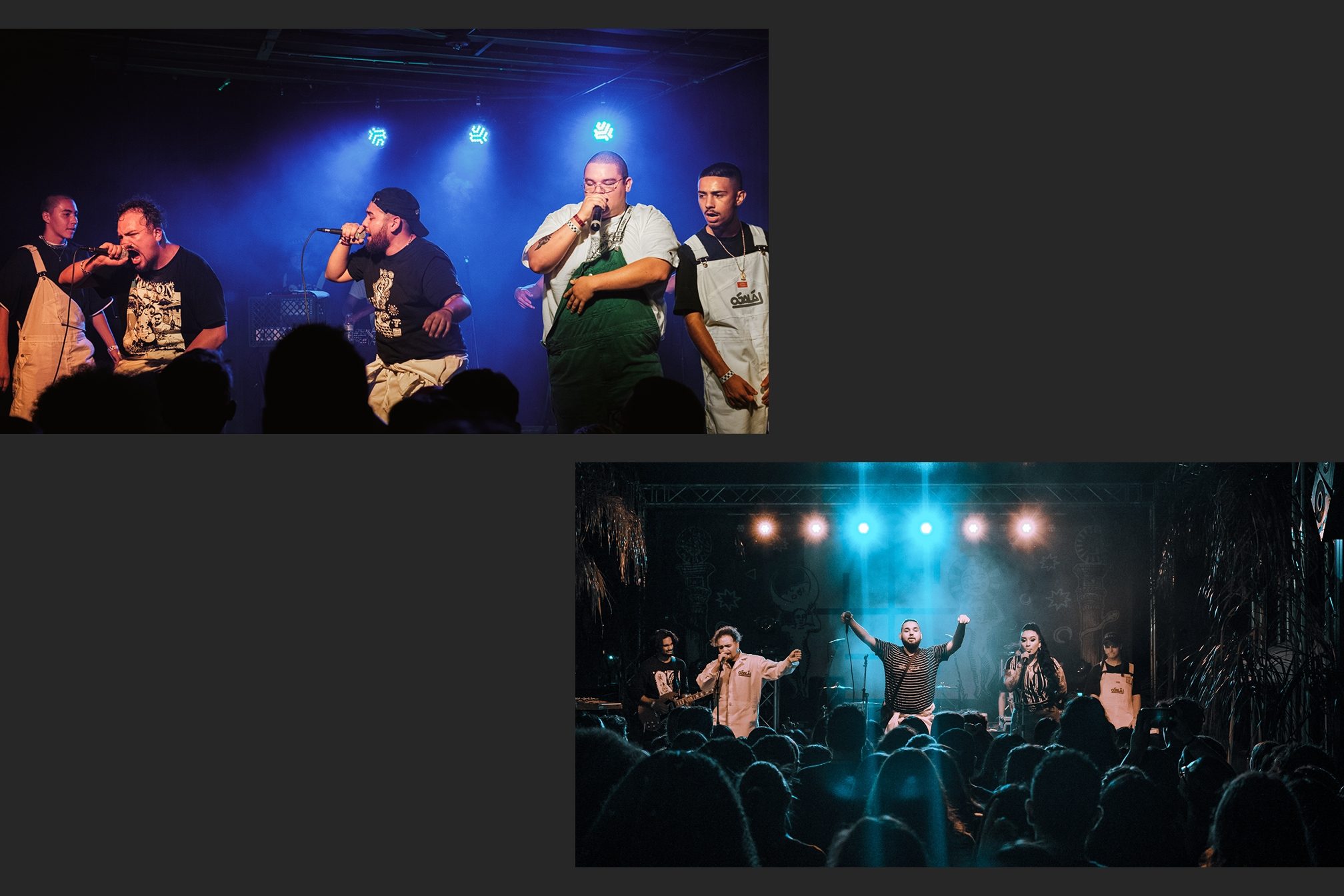
Ojalá Systems epitomise the importance of collectives in local scenes. They aim to help creativity flourish as well as striving for bolder aims like challenging hegemony with radical ideologies. Ojalá was founded in late 2016 by visual artist Mylkweed and DJQ, who produces beats and writes poetry on top of spinning records, with the aim to “create something larger than just their individual collaboration” in response to a “resounding frustration at the lack of spaces and infrastructure for young artists in Tucson”. Its membership is now in the double figures, taking inspiration from groups such as Wu-Tang Clan and Odd Future and musical entrepreneurs like Nipsey Hussle to unite in the joint aim of empowering their community. Writing and performing music, producing zines and leading activism are just some of the undertakings that fall within their expansive remit.
Ojalá open up the festival on Thursday evening in the Hotel Congress Plaza, a charming outdoor stage bathed in warm lighting and decorated with the visual identity Mylkweed designed for the festival. He was awarded a sponsorship by crowdfunding platform Kickstarter’s director of music Meredith Graves to become HOCO’s first featured visual artist. Building on Collin Fletcher and Lauren Bailey’s early branding, Mylkweed shifted the visuals to incorporate magickal symbolism. “I feel that the performance of music, visual art or writing is always a sort of incantation. When we make or consume art, we are invoking energies, spirits, deities and beings. Gathering people in a city like Tucson, which has 10,000+ years of human history, to celebrate music and art is simply too good of an opportunity to invoke magickal energies,” he says of the creative choice.
There’s an enchanting energy in the air throughout Ojalá Systems’ performance, as the first set of the weekend proves to be the standout. Three vocalists front the stage. REY and PSYPIRITUAL bound across the platform, delivering spirited raps about growing up in Tucson and surviving a society that inflicts violence on people of colour. sadgalnina maintains a more still stage presence, transfixing the audience with her emotive singing and prompting eruptions of applause when holding powerful notes. Mylkweed stands back alongside musicians DJQ and Paul the Simple, who provide the backing track of smooth Dilla and Mac Miller-inspired beats. They also aren’t shy about getting on the mic to join in with politically-charged shouts: “Fuck the police, fuck the border patrol, fuck the government.” At one point the crowd response is so rapturous it sets off a nearby car alarm.
But their expressions aren’t gung-ho crowd pleasing. Ojalá are critical thinkers whose words and actions are a direct response to the oppression they face. “Saying 'fuck [insert any apparatus of state sanctioned violence & oppression]' isn’t something groundbreaking or new, it's something we've known since we were young, something we experience and something which our people have felt for generations,” say the members of Ojalá. “We believe that in a society which politicizes our realities, the personal inherently overlaps with the political. We are politically charged because that is our reality, it's not academic knowledge or an aesthetic selling point; it's real, harsh life experience."
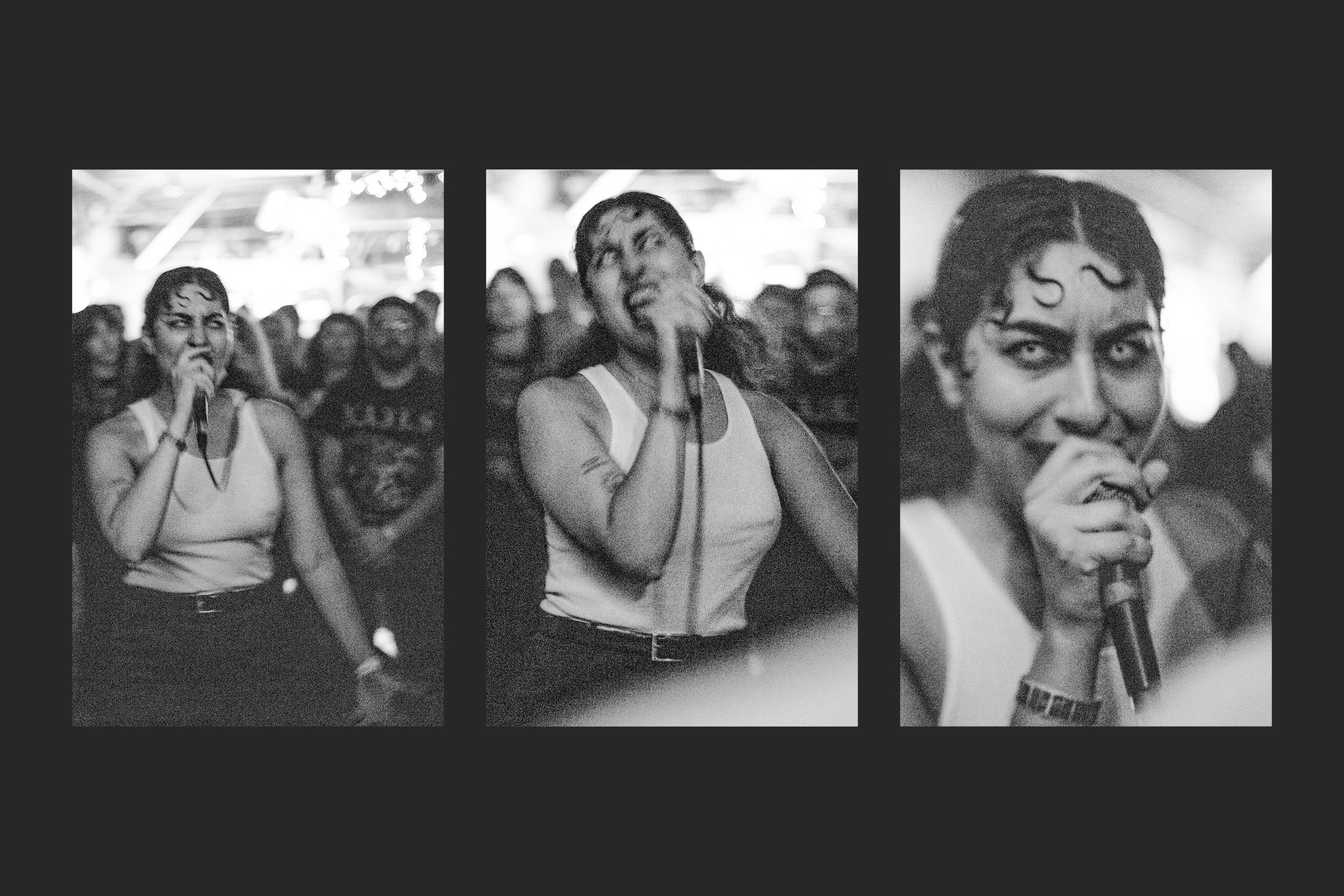
Friday brings more fiery performances. At grungey warehouse venue 191 Toole a line-up of predominantly hardcore bands whip up moshpits with fast and ferocious tracks. The only solo act of the night steals the show. NGHTCRWLR, the electronic noise project of Kristina Esfandiari, enters the stage looking fearsome in whited-out contact lenses. She gestures for the house lights to dim, plunging the venue into darkness, and lets loose. A slew of industrial sounds cascade from the speakers as NGHTCRWLR takes up a mic and leaps off the stage. At floor level, she screams in guttural, deranged tones over the throbbing soundtrack, writhing among the crowd as her message rings out: “let children scream”.
Read this next: Weird times in the world means we need more oddball music
Later that night at Club Congress, Chris Vargas of Montreal-based duo Pelada follows suit. While her production partner Tobias Rochman lays a foundation of swampy acid and buoyant piano house, Chris marches through the audience channelling rebellious rage via serrated Spanish lyrics and combatively challenging the dancefloor to become more raucous. Mexican Jihad takes over and thrives off the energy Pelada sowed in the room, unleashing a set that barrels from the trancey heights of Faithless’ ‘Insomnia’ to the unruly rap of Sheck Wes hit ‘Mo Bamba’. The intensity carries through to the next day as Dana Dentata treats 191 Toole to an unhinged performance of corrosive goth rap. A baby doll hangs from an umbilical cord-like chain from her full gimp suit outfit. She uses it to whip the audience.
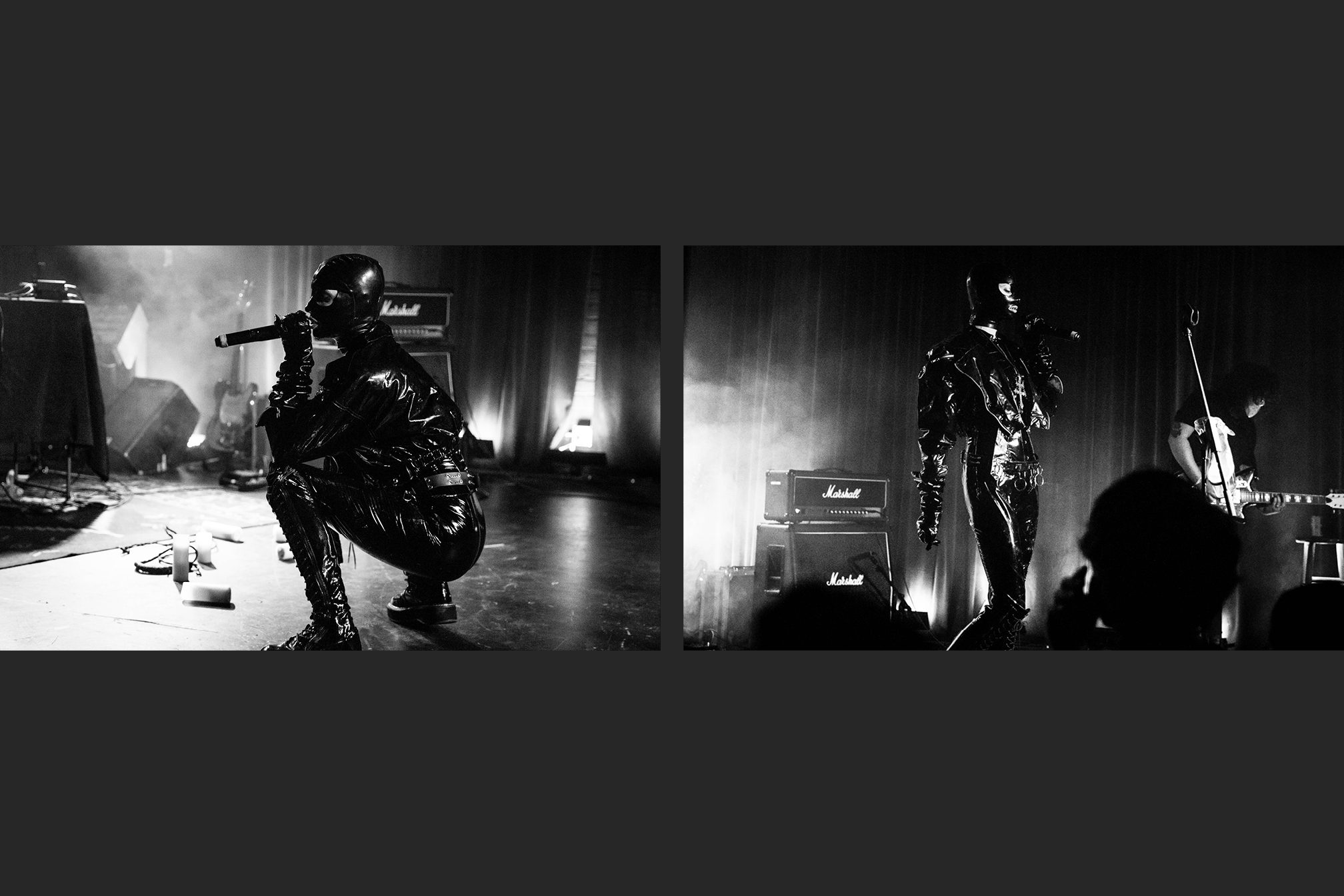
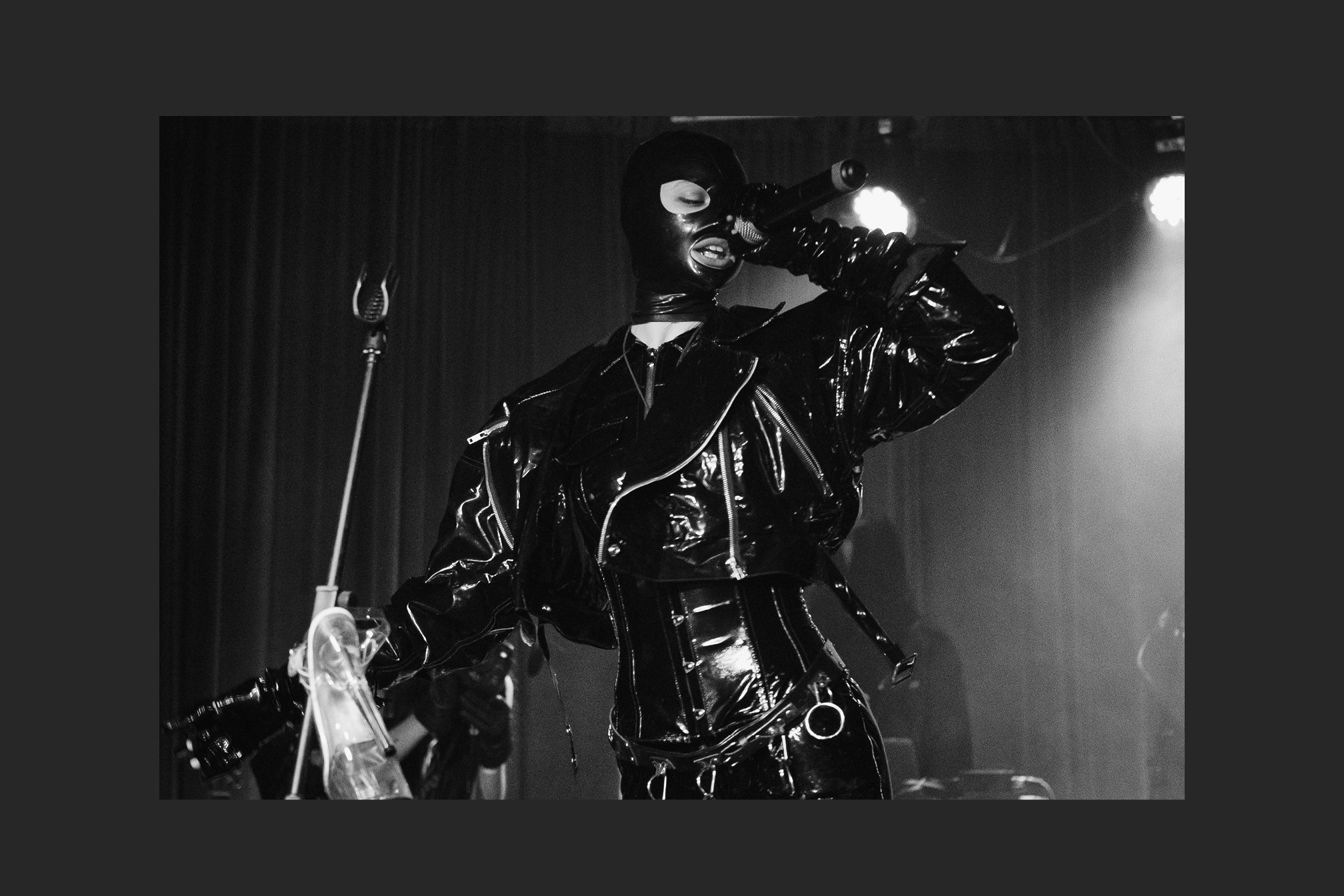
The insurgent spirit of the acts playing HOCO Fest is a programming choice. “All of the artists we book share the common thread of being progressive, independent, uncompromising, political, and innovative,” says Matt. “I believe music festivals have the power to inspire and connect. We want to do more than just throw a big party; we want to help our creative community grow and thrive in any way we can. Music may be the reason they come, but one can only hope they leave with so much more.”
Read this next: New Perspective: How Cxema parties are changing the face of the Ukrainnian electronic scene
These acts are all responding in some respect to the world’s sociopolitical climate, and in Arizona, that backdrop is particularly tense. Matt explains how Tucson - 70 miles north of Trump’s border wall construction and 100 miles south of Phoenix, the most moved-to city in the US right now - is in the eye of the storm: “What's happening in the Borderlands right now is extremely upsetting. Families are being torn apart, people are being treated like prisoners for seeking asylum, unique and invaluable ecosystems are under attack; it's coming from all angles.”
It's a nightmarish situation, but the strength and resilience locals show in resistance is invigorating. “We don't want to be known for 'the wall', but rather for our fearless community, fighting together for justice, standing up against dehumanization and gentrification,” says Matt.
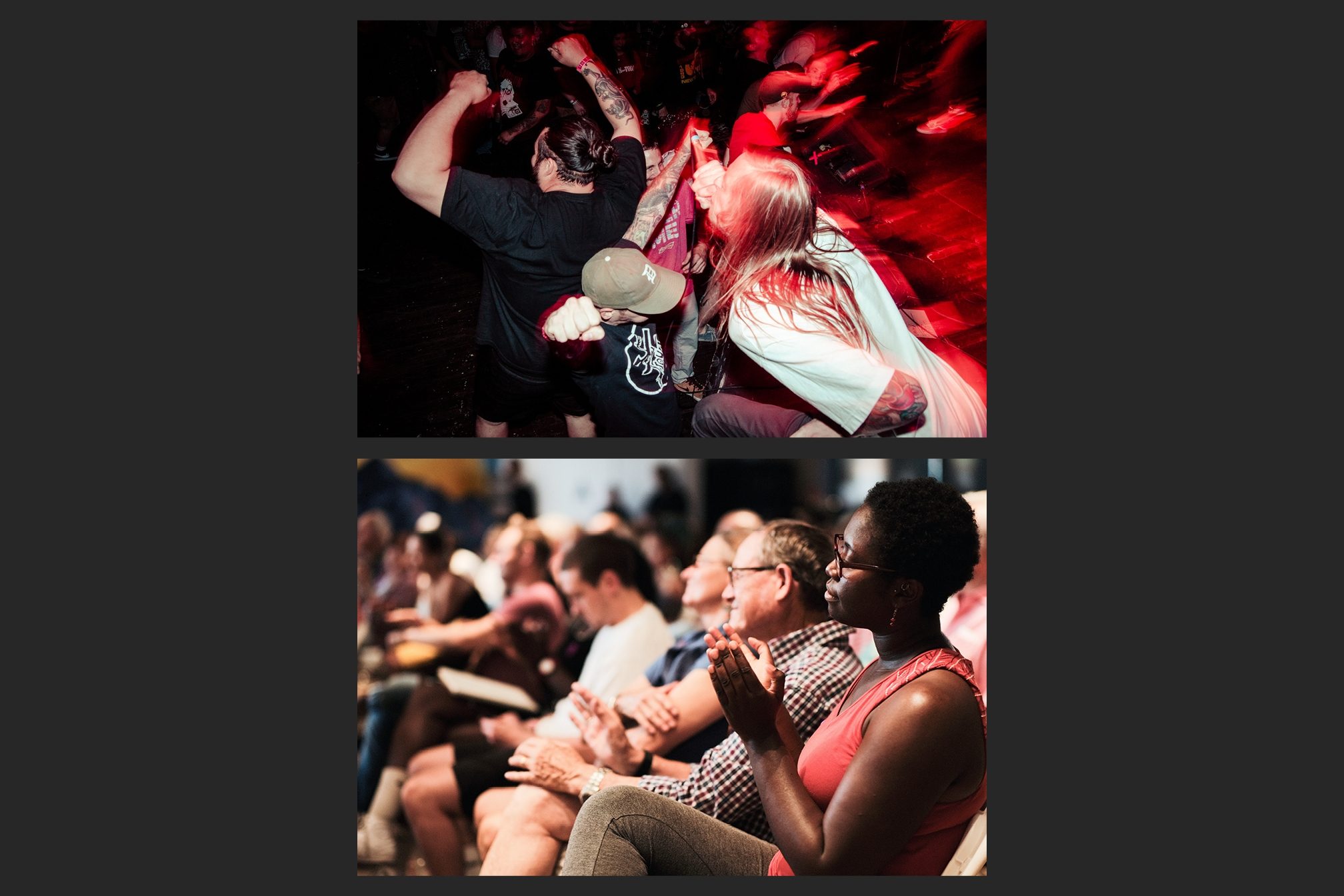
On Saturday afternoon, the Tucson Museum of Art hosts a panel of local activists, environmentalists and academics for the A New Border Vision panel. Matt hasn’t been to sleep since I last saw him in the early hours of the morning at LSDXOXO’s thumping after party set inside a nearby art gallery, running around completing various tasks to keep the festival running smoothly, but he’s present and in good spirits with his recently born son in tow: “Baby’s first panel!” he says with a grin.
Read this next: Sustainable sesh: How clubs and festivals are boosting the green agenda
The panellists mince no words in front of the diverse young and old crowd, opening with a condemnation of the US border’s historical illegitimacy: Laiken Jordahl from the Center for Biological Diversity asserts that Tucson is a city founded on land stolen from the O’odham, Hiaki, Hohokam, and Trinchera peoples.
Zaira Livier, who migrated into the US from Mexico aged 8 and remained undocumented for a long period of time, talks potently about her experiences, including her brother’s own deportation back to Mexico and subsequent murder. She’s intent on fighting to defend human rights and works resolutely to this goal as founder of the Peoples Defense Initiative. She became a US citizen in 2018 and cheers greet the announcement she will be voting in her first election this year.
However, reliance on the country’s political system is something the panel urges a more critical view of. The groundswell of activism in the wake of Donald Trump's election in 2016 is referenced alongside a reminder that the Democratic Party are not saviours. Zaira speaks on how she wants protection for undocumented families; it was the Obama administration that deported her brother. Putting effort into grassroots campaigns such as PDI and Indivisible Tohono, represented by Hon'mana Seukteoma on the panel, is posited as more effective in pushing their radical aims. Ojalá Systems’ Mylkweed calls for individual action, especially from privileged groups such as able-bodied, documented white people who have the time and resources to help. He also speaks about the role of art and music in spreading hope and positivity, saying it’s artists’ job to “entice people to dream of new worlds".
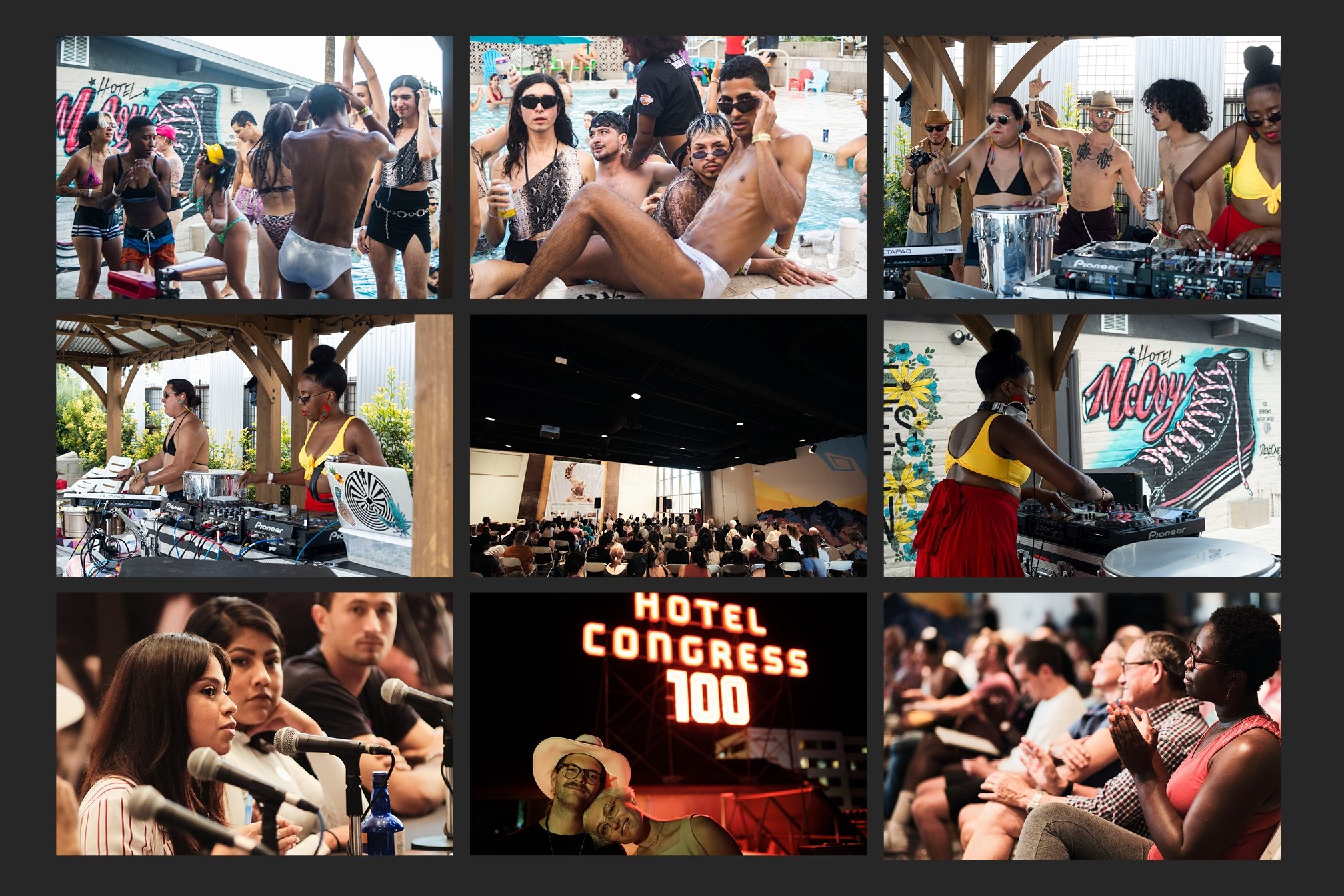
Encouraging a community to unify and look after each other, check each other, respect the land, be resilient and hopeful: the panel discussion feels intrinsic to the foundations of what makes HOCO feel so special. You see evidence of these aims throughout the festival. It’s a celebration, but it isn’t escapism. The context HOCO exists in is at the heart of its drive for a better future.
Read this next: Politics and dance music are intertwined and there's nothing you can do about it
“People commonly think that art is a thing which belongs to the privileged in academies, and that those of us living in situations of everyday violence and oppression cannot afford to make art. This is quite wrong,” say the members of Ojalá Systems. “Our reality creates a unique kind of pressure which fortifies all people in oppressive conditions; we want to shift the narrative that oppressed people are somehow downtrodden and weak.” Ojalá see their art as a means to project their own narratives and dispel myths about their people. The outsider view of Arizona can be harsh: a Red state populated by bigots that’s ground zero for racist legislation like the feared SB 1070 Act. Ojalá assert these are “problems directly caused by the wealthy white ruling class.” In short: “everyone is talking about us, but it feels no one is talking to us.”
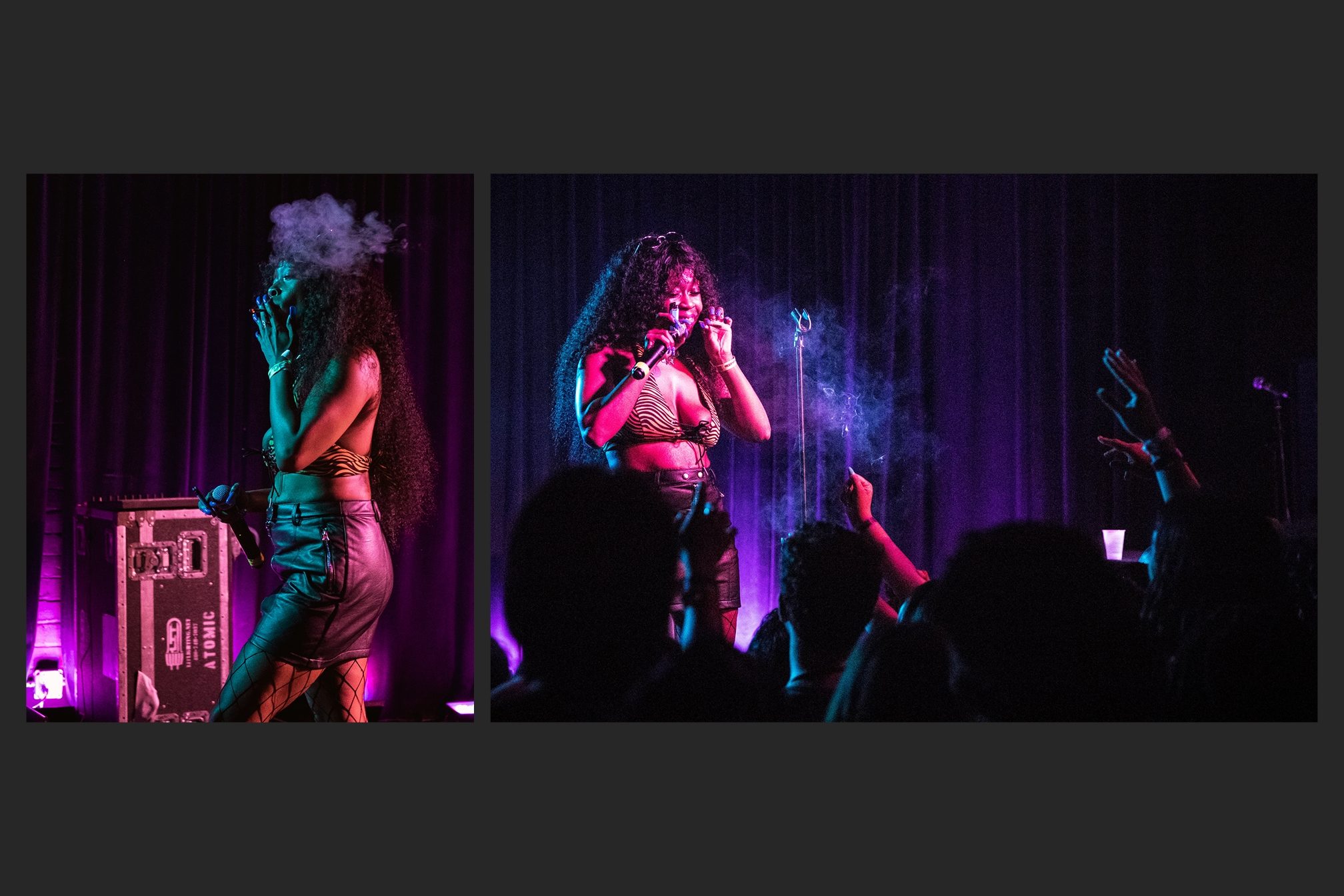
J S Aurelius, founder of label and art collective Ascetic House, believes that the Arizonan people and setting are what sets apart HOCO apart from the abundance of music festivals on the planet. “There is something special about being in the desert, and about being with the people who call it their home,” he says. “The desert is impossible to exploit so there is no pretense about it. No industry, no commodity. It is simply itself, not to be transformed into something else.” Aurelius arrived at HOCO direct from the stage at Berlin Atonal, booking a flight that left immediately after his European set time because he couldn’t bear to miss a moment.
And there are so many unforgettable moments. Aurelius plays Saturday night in converted funeral home Owls Club, powering through club-primed sounds from the likes of M.E.S.H., Ziúr and Objekt before Minimal Violence take over and send minds spiralling with their berserk acid live set. Bembona and the Sonido Tambó crew bring colourful dancehall and queer-friendly vibes to the pool party at Hotel McCoy. Even a rare downpour of cold rain feels transcendent as a live percussionist bangs out rhythms and conga lines dance through the water. BbyMutha has 191 Toole in raptures with her empowering brand of attitude-drenched hip hop. She softens as she thanks the crowd and festival for supporting independent artists, shouting: “These shows can change lives." Djentrification is equally earnest as he closes out the festival at Congress Plaza, hopping on the mic in between his funky 7” selections with grateful appreciation for the engergetic dancers.
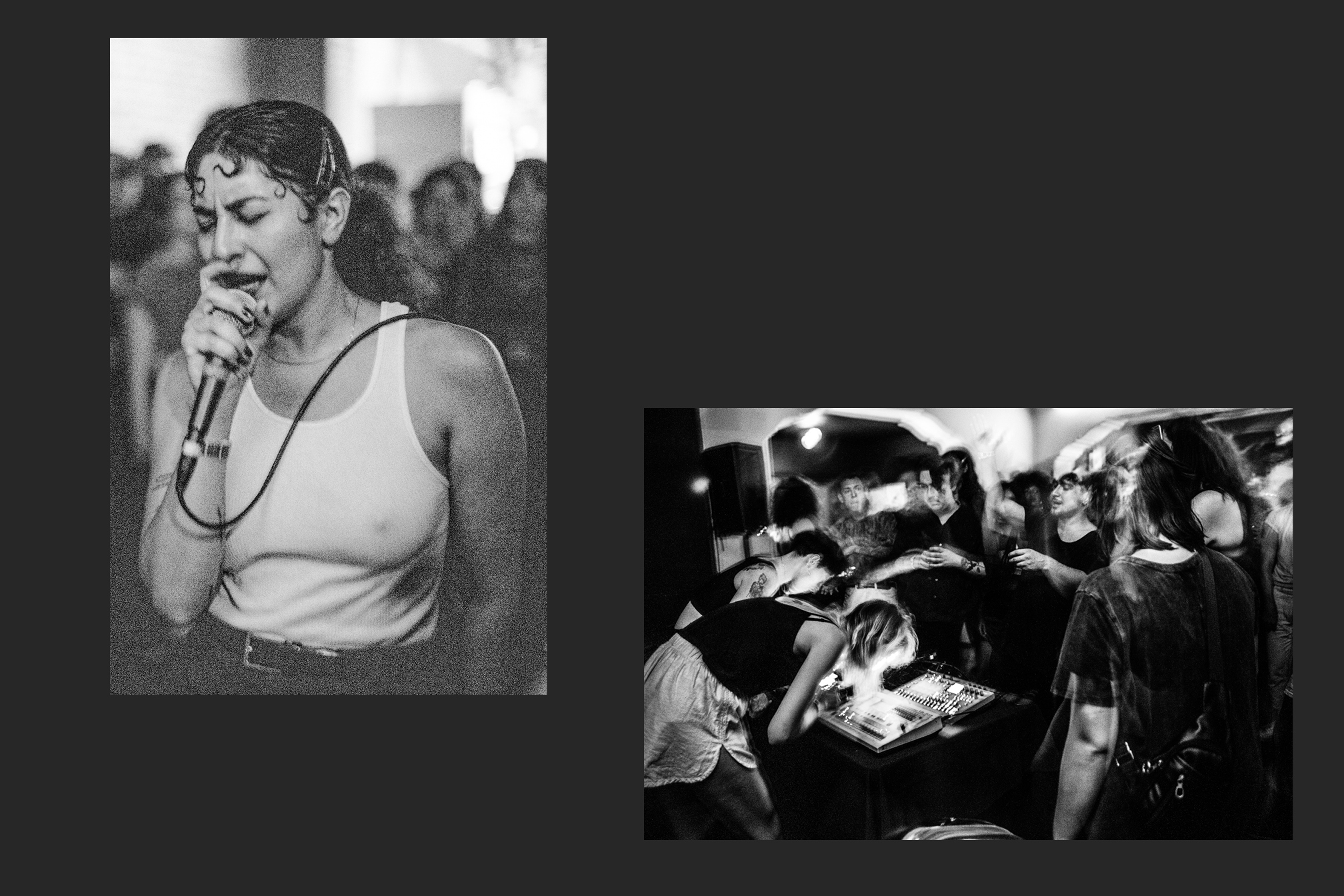
“[HOCO] has got that impossible thing that every festival I've ever been to or played is striving for, but few rarely achieve. It's truly mythic,” says Aurelius. But there’s no mythologising when it comes to the very real efforts that surround HOCO and help it reach these heights. “HOCO has a symbiotic relationship with the Arizona arts and music scenes,” says Aurelius while discussing the festival’s role in developing the local scene. “I don't think it's fair to place too much weight on the shoulders of "The Festival", because the festival is the community in many ways. The people curating, laboring, making decisions, styling artists, taking photos and videos, stage managing, promoting... are the people doing the same thing in Arizona year round.”
HOCO is a mirror to Arizona. It’s the tight-knit community, the creative energy, the determination. More simply, as J S Aurelius conveys, HOCO is Arizona. And if the time between my 5am wake-up call on Thursday to my flight home on Monday taught me anything, it’s this: Arizona doesn't feel intimidating, Arizona feels like the best place in the world.
Patrick Hinton is Mixmag's Digital Features Editor, follow him on Twitter
Read this next: Get the best of Mixmag direct to your Facebook DMs



